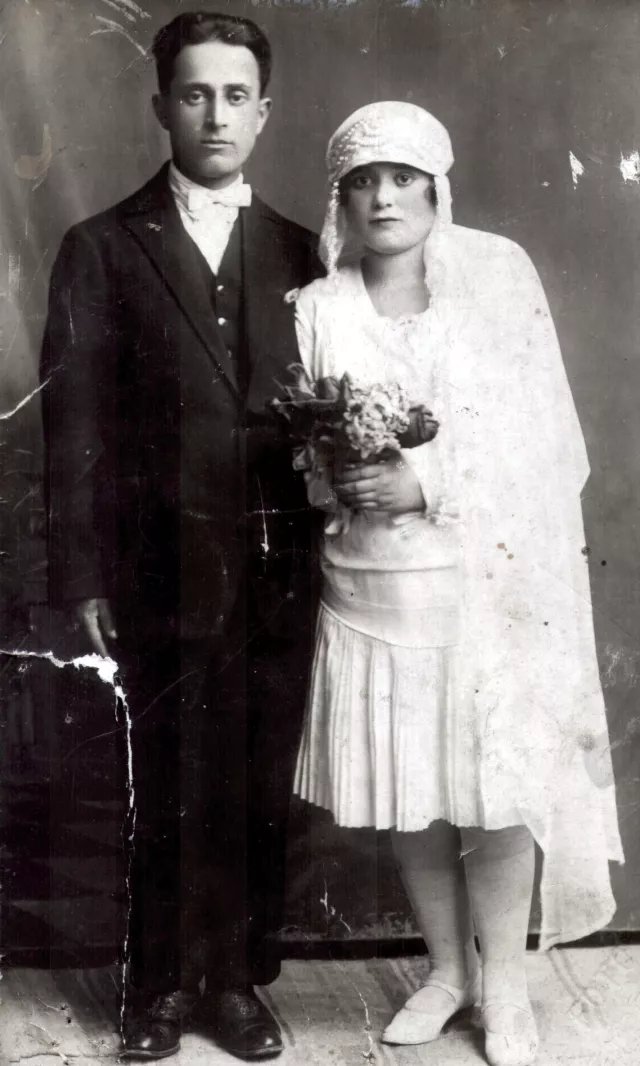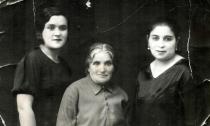Tamara Koblik’s parents Beila Uchitel and Elih Podriadchik
These are my parents Beila Uchitel and Elih Podriadchik. This photo was taken in Floreshty in 1928 on the second day of the wedding. When looking at this photo my mother always worried that she didn't have her veil on her properly - it was pulled too low on her forehead.
My mama Beila Trostianetskaya was born in Rezina in 1907. She was the second daughter in the second marriage of my grandfather. Mama was just 12 years old, when my grandfather died, and her 'feter' [uncle in Yiddish], he must have been my grandfather's brother, took her to his home in Floreshty. 'Feter' taught her his tailor's business. He said: 'she will work for me, and I will save for her dowry'. She was a poor relative, and she had to fetch water to their house for the period from 13 to 20 years of age. She was booming with health, a very pretty girl. Boys were gazing at her and bothering her. Once one of them asked her: 'Girl, how many buckets of water does one have to fetch to become a dressmaker?' Mama looked at him and replied: 'As many as one is destined to fetch'. Another rascal intending to make a joke and said even a worse thing: 'I'd rather lie with you than with typhus'. Mama felt very hurt, but she held back her tears and replied: 'No, I'd rather have typhus'. Mama's first love was in Rezina. His name was Ehil Spivak. He returned her feelings, but Ehil was the only son in a wealthy family. He was spoiled, and besides, his parents did not appreciate his connection to mama.
My mama met my father Elih Podriadchik in Floreshty at the age of 20. He liked her at once, so pretty she was. They began to see each other. From what my mama told me, they walked to dancing in the neighboring village of Markuleshty, 3 km from Floreshty. Mama loved dancing and long walks didn't bother her at all. When papa proposed to her, she only had 17,000 lei of dowry while the standard amount of the dowry was 20 thousand. Papa said: 'I will add the remaining amount so that people cannot say anything about you having less than a girl is expected to have'. They got married in 1929. My older sister Sheiva was born in 1930. Mama told me that when she visited Rezina a year later, she bumped into Ehil. There was so much pain in his eyes as he looked at her: 'I'd rather Keila had this baby'. My mother's sister Keila didn't have children as yet. Mama loved him her whole life. She didn't love papa.
Papa rented his shop facility from Petru Turcan, the owner of an inn in Floreshty. We had two rooms: papa-s shop was in one room - he had 5 or 6 young employees and his clients visited him in his room. Papa made men's clothes. His employees were young Jewish men and women. We spoke Yiddish at home and Moldavian - with our neighbors. There were sewing machines and big coal-heated irons. There was also a stove in this room. We had a portable steel stove on four legs where mama must have cooked our food. There was a rid on top where mama roasted eggplants and paprika. Mama also baked chicken liver on live coals. The Jewish rules require having blood removed from meat, and mama baked it on oiled paper. We surely followed kashrut. There was another big room, our bedroom. On Sabbath papa's room turned into a fancy room. The sewing machines were covered with white cloth. Mama covered the table with a white fancy tablecloth. On Sabbath and Jewish holidays we celebrated in this room. Papa went to the synagogue on Sabbath. When he returned home, we had dinner sitting at the festively served table.


















